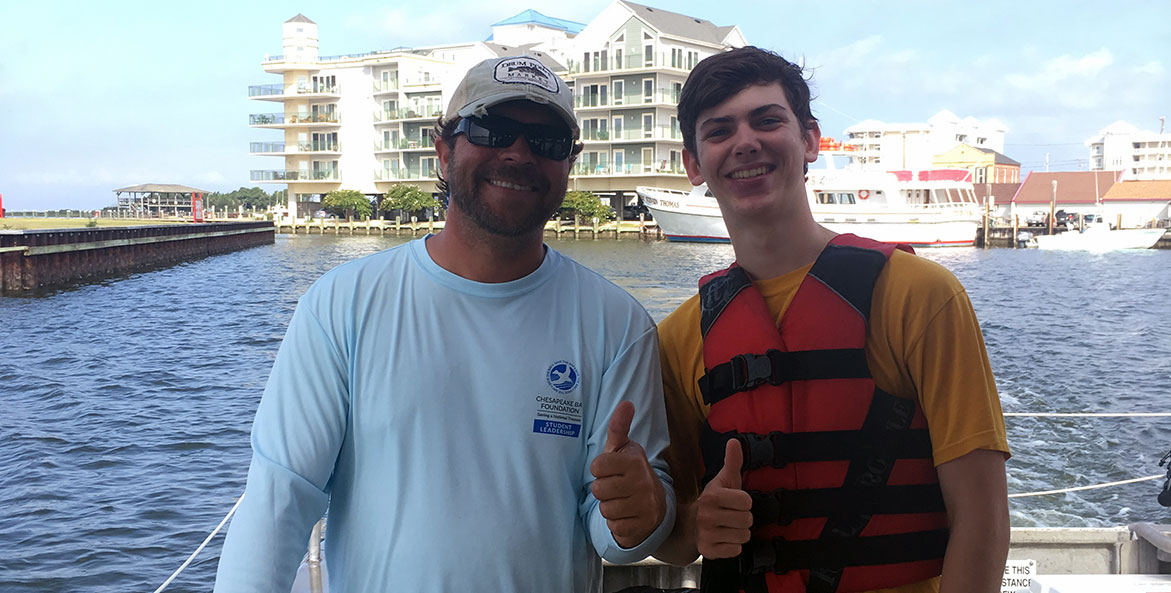From a young age, I have had a deep connection with the outdoors. I have become an avid camper and hiker after many trips with my family and the Boy Scouts. As I became older, this transferred directly into a love for the environment and passion for protecting it. I joined my high school’s Global Ecology magnet program and from there was encouraged to join the school’s Chesapeake Bay Coalition, an environmental club that works to protect the watershed and Bay. One of the meetings for this club featured Megan Fink from CBF’s Student Leadership (SL) program as a guest speaker. When Megan spoke about the SL summer trips, I was immediately sold. In 2019, I went on a summer trip to Fox Island and have been very active in Student Leadership ever since, taking advantage of all the amazing opportunities in the program.
I have continued to be involved in SL and am now the co-president of the Chesapeake Bay Coalition at my school. This November I was contacted by a staffer from the office of Montgomery County Councilmember Evan Glass who was seeking support from high school environmental clubs on a new Zoning Text Amendment (ZTA) that would increase composting capabilities of farmers in the county. After learning a bit more about the ZTA, I realized just how helpful it will be for the environment.
Montgomery County’s ZTA 20-04 will encourage increased composting throughout the county, thereby lowering the amount of waste ending up in landfills and incinerators. This in turn lowers our greenhouse gas emissions. The ZTA will also lead to increased use of higher quality compost on farms, which will improve soil health. Improved soil health significantly decreases the need for artificial fertilizers and other chemicals, encouraging more sustainable agricultural practices and leading to a decrease in erosion and eutrophication as well as an increase in carbon sequestration. The ZTA is a smart step toward fixing the environmental issues facing Montgomery County and could serve as a model for agricultural counties across Maryland and the country. It is the epitome of the saying “think global, act local”.
The ZTA is such a beneficial amendment, and I wanted to do all I could to support it. At one of my school’s Bay Coalition meetings, I helped members of the club write letters to the county council voicing support for the ZTA. Evan Glass’s staffer then recommended that I testify at the county hearing for the ZTA.
The idea of testifying in front of my elected officials and the general public was pretty intimidating, but I agreed to do it, and it was a lot easier than I expected. All I had to do was sign up beforehand, prepare a two-minute speech, and then show up on the day of the hearing. The fact that the hearing was virtual made it a bit less scary, but I think the biggest thing that helped me was just preparing ahead of time.
Protecting the environment is vitally important to our future, and it often requires stepping outside your comfort zone to speak up about important issues. It felt great to advocate for an issue I feel is important. I look forward to testifying again in the future for other important environmental legislation. Our elected officials won’t know what issues matter to us unless we say something, so public testimony is an extremely important form of advocacy. It is intimidating, but I encourage everyone to find ways to testify in your local communities.
Here is a written copy of my testimony from the county hearing:
Hello, I am Connor Ransom, and I am currently a senior at Poolesville High School and co-president of Poolesville High School’s Chesapeake Bay Coalition, a club working to fix environmental issues in the Chesapeake Bay watershed. As a member of Generation Z, the threats of pollution, climate change, and other environmental issues are especially impactful to me. If our leaders don’t make changes right now, there will be irreversible effects on the world that my generation has to live with for the rest of our lives. While these are global issues, it is essential to take steps locally towards fixing them, and the proposed ZTA is the perfect example of good local action.
ZTA 20-04 will encourage increased composting throughout the county, thereby lowering the amount of waste ending up in landfills and incinerators. This in turn lowers our greenhouse gas emissions. The ZTA will also lead to an increased use of higher quality compost on farms, which will improve soil health. As someone who lives in the Ag Reserve, this is especially important to me. Improved soil health significantly decreases the need for artificial fertilizers and other chemicals, encouraging more sustainable agricultural practices. It also helps to support the life of essential microbes which live in soil and help produce greater crop yields for farmers. All of this leads to a decrease in erosion and eutrophication, as well as an increase in carbon sequestration, meaning that the ZTA will directly improve the health of the land and water where I live.
ZTA 20-04 has numerous benefits. It is a good step towards fixing the environmental issues facing Montgomery County and could serve a model for agricultural counties across Maryland and the country. It is the epitome of the saying “think global, act local”. I whole-heartedly support this proposal both as a youth leader and as a citizen of the agricultural reserve. Thank you for your time.



